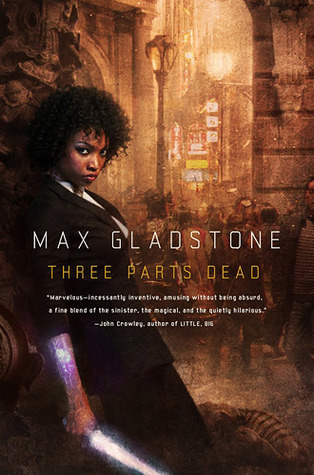5 Stars
Three Parts Dead
Every time I read one of Max’s Craft Sequence books, I am in awe of the scale of things. He works with things as complex and nebulous as faith and economies but then turns around and hides Gods in the details. And on both scales he has so much going on around the everyday(ish) lives of the main characters. The Craft Sequence is a fascinating examination of power, morality, justice and so many other part of our lives wrapped up into a gripping murder mystery complete with epic romance and subterfuge. Oh, and did I mention the main character is a black woman and most of the main cast is fantastically written women?

Cover from Goodreads
In order to motivate myself and justify a reread of The Craft Sequence, I am teaming up with Marzie’s Reads and guest commenter, and friend of the blog, Jenni for a buddy read! We started with Three Parts Dead, the first of the series to be published, but the third book chronologically within the series.
For the first part of our discussion, check out the post on Marzie’s Reads at http://marziesreads.blogspot.com/2018/01/the-craft-sequence-buddy-read-book-1.html. Fair warning, our discussion is *FULL* of spoilers.
Here’s part two, picking up right where we left off!
Alex: I want to talk about Elayne a bit more. Throughout the book, it becomes clearer and clearer that Denovo is the worst kind of abuser, one that is enabled and even encouraged to continue and refine his abuses. Both Tara and Elayne are victims of his abuse, and Elayne was his first victim. I really loved the twist at the end, when she got her revenge. But how did you feel about how that was handled.
Marzie: The ending, where Denovo gets his just desserts, is wonderful. And so perfect for this moment, where #metoo is everywhere. This is so much the way things go when abuses are reported, and especially when abuse is reported by women against men. Maybe we’re on the cusp of change, but when Three Parts Dead released, women were still in the thick of things with respect to this type of behavior- men abusing women in the work or academic setting. All that said, the handling of Tara’s accusations against Denovo at the Hidden Schools is pretty galling.
Alex: I loved the ending so much. I was furious at the school too.
Jenni: The ending was extremely satisfying. And I found the school’s complicity infuriating – although to me, what really struck me was how they allowed their ends to justify Denovo’s means. His abuse resulted in a phenomenally powerful source of Craft, and that was more important to the School than the way in which he was generating it. They cared more for destroying the Gods than they cared about the well-being of their students.
Marzie: Does Alexander Denovo in the end seem less human and humane than Kos, who wants his Seril back? I’m still seared by the image of Denovo cutting out Seril’s eyes. So awful.
Alex: I agree with you there, I think there’s a massive failure on Denovo’s part to have any humanity. Kos is certainly more compassionate and motivated by emotion rather than the acquisition of power. Kos and Seril were lovers, they had been separated by man, by Craftsmen. The Gods are much like the gods of different pantheons we’re already familiar with – the Greek Gods loved and hated and warred. The Craftsmen were so obsessed with destroying the gods that they didn’t care that they were destroying the WORLD, so what chance did Tara or Elayne have in convincing The Hidden Schools that Denovo’s craft was doing harm, and it was harm enough for them to care about stopping.
Jenni: I agree that the primary issue was Denovo’s utter lack of humanity. It stood in such stark contrast to Kos. Not that Kos wasn’t godly, but that his emotions made him seem more humane than Denovo, an actual human. He was a much more fundamentally decent being than Denovo, and seemed warmer than the Craftspeople; emotions do not automatically equal human.
Alex: I think it was deliberate, pitting a loving Kos against the unloving Denovo. I think the idea is that despite being a god, Kos was more human-seeming than Denovo who WANTED to be a god.
Marzie: If we are talking about Denovo’s lack of humanity, can we discuss what is up is with the Hidden Schools allowing him to teach and devastate their student population? How is that sustainable? To me, Denovo is shackling potential competition. He’s stripping the world of any potential competitors for his God-dom.
Alex: I think you’re absolutely correct that the school was allowing Denovo to shackle and hamstring his competition in pretty much every sense of the word. It’s Horrifying.
Marzie: My big question is why?
Jenni: I think it’s because they are just potential when they’re students. They may or may not be able to significantly advance the School’s goals after having years of intensive training. If Denovo harnesses them and bleeds them dry, yes, some of them that would have become great Craftspeople will not be as useful as they could have been otherwise, but on average, it probably works out as a win for the school. They’ve got a guaranteed return on all the warm bodies, and don’t have to worry about independent thinking.
Marzie: I mean why is the school allowing it? It will destroy the school. This is my one problem with the Denovo plot. Denovo isn’t running the entire school, is he? In an amusingly modern day nightmare, he is a narcissist. But that doesn’t explain what is going on in the school and how it is permitted to continue.
Alex: Yes, there’s other faculty. But who’s to say he doesn’t have them in the same thrall he has his students in? And to be fair, lots of companies know about corruption and let it happen rather than address and fix it because in the end, the corruption is lucrative.
Jenni: Exactly, Alex.
Marzie: I guess I feel it is the sole weak spot in the plot. Denovo destroying the student body with the knowledge of the Hidden Schools and Craft firms around the world makes little sense to me, as ultimately it will finish the school, and deplete the pool of potential craftsmen and women for the workforce.
Alex I agree that it’s a weak spot. I think this might be something to ask Max about in a Q&A sometime.






